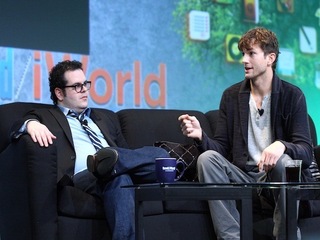
As tech moves beyond nerd turf, celebrities take note
The tech and entertainment industries have long had a close relationship

While tech has always enjoyed a reputation as the exclusive dominion of a certain nerd elite, it’s not immune to pop culture. It’s probably fair to say that tech expanded beyond nerd turf with the advent of the Internet and the rise of the Web video and YouTube, illegal music downloads via Napster, which led to streaming video and music services and more.
And then something happened: tech became cool. Knowing how to code used to be a rare and slightly kooky personality quirk, but now it’s profitable (which some have credited with killing the tech dating scene). And more and more, entertainers and celebrities are getting in on the action—often in ways that aren’t even related to the entertainment industry.

Take commerce, for example. In October, we’ll be holding our fourth annual Vator Splash LA competition, which will include keynotes from The Honest Company co-founders Brian Lee and Jessica Alba. How do you go from The Fantastic Four to subscription commerce?
At Vator Splash Oakland, legendary rapper and tech investor MC Hammer touched on this topic, noting that music and tech come from the same part of the brain. This is true of creative endeavors in general—entertaining and starting a business both require creativity.
Alba started the company with Chief Product Officer Christopher Gavigan, who was previously the CEO of Healthy Child Healthy World, a nonprofit designed to educate and empower parents on avoiding the everyday toxic risks around them. Both Alba and Gavigan are parents of young children, so their emotional investment in the project is clear.
As the company’s co-founder and president, it’s not clear exactly how much involvement Alba has in the everyday machinations of the company, but whatever level of “businesswoman” she’s become, it hasn’t sunk her into obscurity. That’s because actors and musicians are just as much a brand as an Internet company. The Internet has simply done more to close the loop than traditional brick-and-mortar businesses.

Take Kim Kardashian. Her role as reality TV star is inseparable from her role as businesswoman, because the Kardashians are a brand. To boost that brand, Kardashian became one of the first celebrities to jump on Twitter, which helped bolster Twitter as a platform where fans really could “speak to” and connect with their favorite celebrities on a more personal level than Facebook or other channels. She now has 22.1 million followers and has tweeted over 17,000 tweets.
From there, it was just a short hop to becoming the celebrity face of ShoeDazzle, where Kardashian’s reputation as a trendsetter with an eye for fashion (except for that weird sofa dress) launched the subscription commerce company as a style haven.
Now, the Kim Kardashian brand has been extended to a mobile game—Kim Kardashian: Hollywood—created by Glu Mobile, which has seen shares spike 23% in the last five days on word that the Kim Kardashian game is expected to rake in $200 million this year.
Beachmint took the idea of the celebrity face for commerce to the next level, launching six product lines simultaneously, each with a different celebrity style icon, such as Justin Timberlake, Kate Bosworth, the Olsen twins, Jessica Simpson, and more. The company has since pared down its product offerings to four: JewelMint, ShoeMint, StyleMint, and IntiMint. It also got a boost late last year when Mary Kate and Ashley Olsen bought a minority stake in the company. Their investment garnered them a spot as co-chairs of the advisory board, and they will reportedly take on consulting roles across all of the company’s verticals for key design, merchandise, and business ideas.

Beachmint’s other celebrity spokespeople have also gone on to do other big things in tech. As everyone knows, Justin Timberlake, along with Specific Media LLC, bought MySpace in 2011 and relaunched the once-flagging social network as a music destination in 2013. He has also invested in image tagging platform Stipple, as well as music education startup Miso Media.

Kate Bosworth, best known for being in that one movie that one time, has just launched a new app called Style Thief that promises to be the Shazam of fashion. The idea is, you see an item that you like, take a picture of it, and Style Thief will instantly direct you to the online/mobile destination where you can purchase the item. Bosworth is both co-founder and the company’s chief marketing officer—a notable deviation from the vanilla puff roles celebrities usually take at these companies, like lead style consultant or chief fashion officer.
Celebrity fashion ventures have come a long way in the last couple of years with the evolution of fashion tech—which has gotten a big boost from the evolution of e-commerce. It used to be that a fashion brand had to outsource everything—design, merchandising, marketing, and retail—to other companies. Now, e-commerce software has become so sophisticated that companies like Warby Parker, Trunk Club, and Nasty Gal are able to build their brands entirely online by wearing all of those hats themselves.
Music is another category that has become deeply intertwined with Silicon Valley. Notably, earlier this year, Apple forked up $3 billion for Dr. Dre’s Spotify-like music app Beats Music. Co-founders Dr. Dre and Jimmy Iovine have reportedly joined Apple in an “unspecified capacity,” and Dre even did a phone-in at WWDC last month.

And, of course, there’s MC Hammer, who many in Silicon Valley know as being more than just a celebrity face on a tech product. One might say that Hammer is…legit. Too legit (to quit). Most recently, Hammer was the co-founder and CEO of Wiredoo, a search engine that showed users related information. Prior to that, Hammer was co-founder and CEO of DanceJam, a YouTube-esque platform for sharing dance videos. He’s also invested in Square and Kiip, and has worked with startups like Pandora when it was still Savage Beast, and YouTube back when its office was still located above a pizza place.

Another too-legit celebrity tech investor: Ashton Kutcher. Formerly a biochemical engineering major at the University of Iowa, Kutcher co-founded the venture fund A-Grade Investments in 2011, which has invested in companies like Spotify, Airbnb, Dwolla, Path, Fab, and Uber. Kutcher, himself, has personally invested in Secret, Duolingo, Flipboard, Twitter, Hipmunk, Blekko, and many, many more. He is also Mila Kunis’ baby daddy, so he’s got a lot going for him.
While Kutcher and MC Hammer may be bona fide geeks, the truth is that the Internet has evolved to the point where you can start a tech company without having much tech experience beyond owning a smartphone. You just need a good idea, a creative streak, and the business acumen to hire the right people.
Related News


Ashton Kutcher fails to disclose investments

Watch: MC Hammer on technology and startups

Ashton Kutcher brings jOBS back to Macworld


